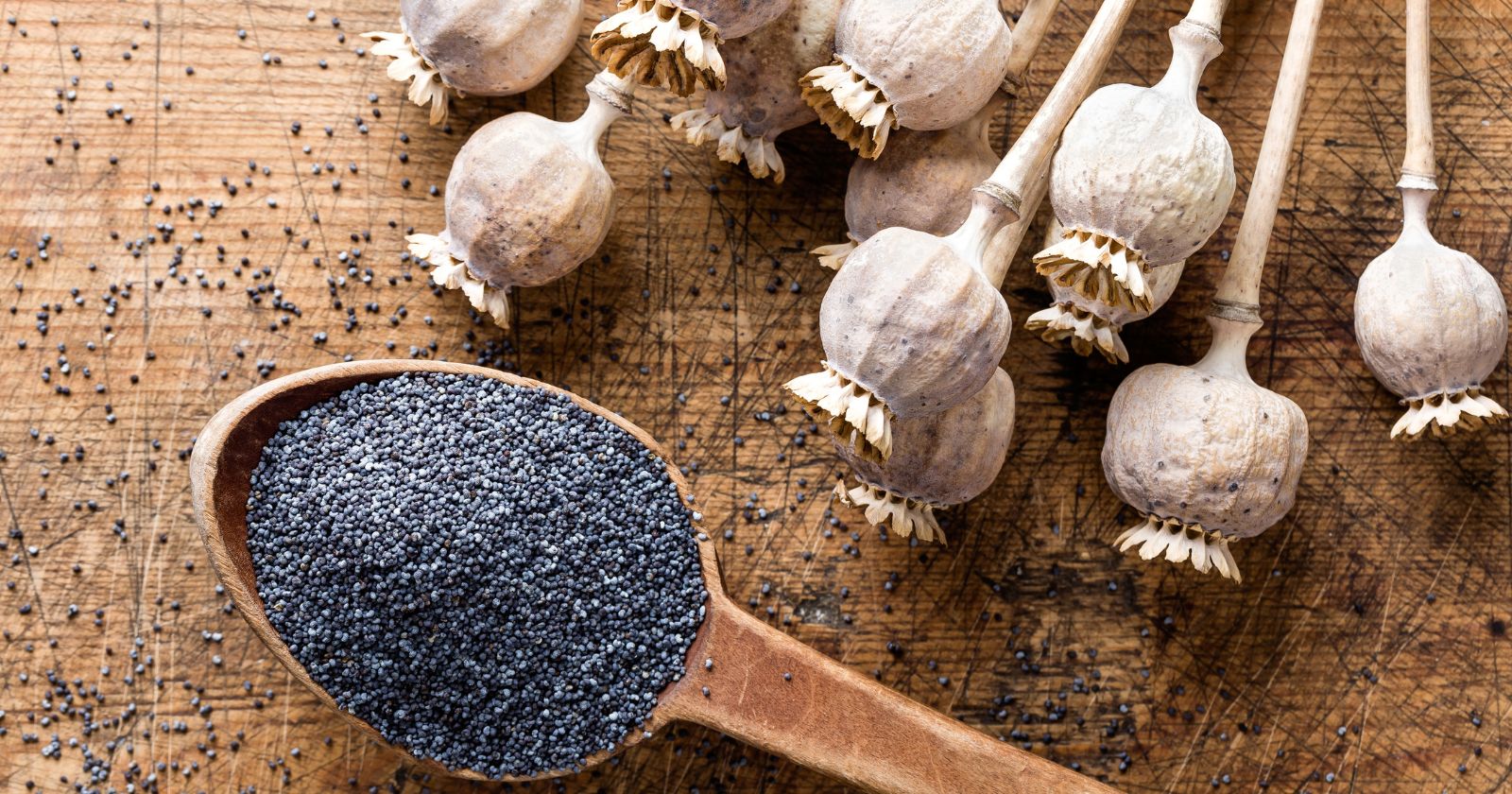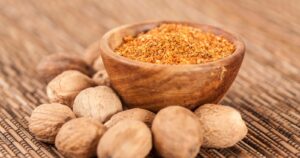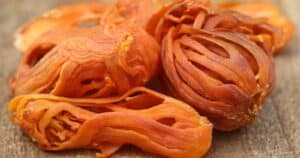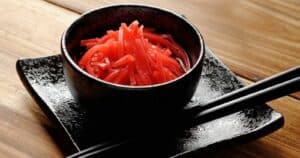Poppy seeds are popular in various dishes, from bread to cake toppings to salad dressings. But there’s more to these tiny seeds than just their versatile flavor.
If you’ve ever wondered about their origins, how they’re used in cooking, and whether or not they have any psychoactive effects, you’re in the right place.
Firstly, let’s address the most common question: can poppy seeds get you high? The answer is no. Although poppy plants are used to produce opium, the tiny amount of opiates in poppy seeds is insufficient to cause any psychoactive effects. So, you can safely enjoy poppy seed muffins without any worries.
Whether you’re a seasoned baker or a curious foodie, you’ll find plenty of inspiration and information in this guide to poppy seeds.
In the following sections, we’ll take a closer look at the history and origin of poppy seeds, their nutritional value, and their versatility in cooking.
We’ll also explore recipes showcasing poppy seeds’ unique flavor and texture.
The History and Origin of Poppy Seeds
Poppy seeds are derived from a fascinating plant known as the opium poppy (Papaver somniferum). Originating in Sumer, a region in ancient Mesopotamia, the opium poppy has been around since roughly 5000 BC.
The cultivation of opium dates back even further, with the earliest recorded use dating back to 3400 BC in lower Mesopotamia. Known to the Sumerians as Hul Gil or the “joy plant,” opium was used for medicinal and recreational purposes.
Poppy seeds, believed to have originated in the Mediterranean and Middle Eastern regions, are an offshoot of opium cultivation and have a long and storied history.
Poppy seeds have been used in a variety of ways throughout history. Here are a few more interesting tidbits about the history and origin of these versatile seeds:
- In ancient times, poppy seeds were thought to increase fertility in women and were often used as a remedy for infertility.
- Poppy seeds have been found in ancient Egyptian tombs, suggesting they were used for culinary and medicinal purposes as early as 1550 BC.
- The Roman Empire utilized poppy seeds extensively, which were often ground up and used as an oil for lamps.
- During the Middle Ages, poppy seeds were popular in various recipes, including bread, pastries, and cakes.
- In some cultures, poppy seeds have been used as a mild pain reliever and sleep aid.
How Poppy Seeds Are Used in Cooking
Poppy seeds are versatile ingredients in cooking that can be used in many different ways. They bring a distinct flavor and texture to dishes that many people enjoy.
Here are some of the ways that poppy seeds are used in cooking:
- Baked goods: Poppy seeds are commonly used in muffins, cakes, and pastries. They can be mixed into the batter or sprinkled on top for added crunch.
- Bread: Poppy seeds are often sprinkled on bread, bagels, and buns for extra flavor and texture.
- Salad dressings: Poppy seeds can be added to salad dressings for a nutty, slightly sweet flavor. They pair well with vinaigrettes and creamy sauces.
- Pasta: Poppy seeds can be added to pasta dishes, such as buttered egg noodles or sauced chicken breasts, to bring a new dimension of flavor.
- Vegetables: Poppy seeds can be sprinkled on cooked carrots or sautéed asparagus to give them a unique flavor that differentiates them from traditional vegetable dishes.
Toasting poppy seeds before using them in a recipe is an excellent way to bring out their full flavor. You release the natural oils by heating them, intensifying their nutty taste.
Another essential thing to remember when cooking with poppy seeds is to use them in moderation. While delicious, too many poppy seeds can be overwhelming and even toxic.
Recipe Ideas Featuring Poppy Seeds
Poppy seeds have long been a popular ingredient in various dishes, and for a good reason! Their unique texture and bold flavor can add a wonderful twist to many recipes.
Some great recipe ideas featuring poppy seeds are:
- Poppy Seed Muffins: These delicious muffins are perfect for breakfast or a quick snack. The poppy seeds give the muffins a delightful crunch and a nutty flavor. You can use any muffin recipe and add a few tablespoons of poppy seeds to the batter.
- Lemon Poppy Seed Cake: This is a classic dessert that is loved by many. The tangy lemon flavor and the nutty taste of poppy seeds create a delicious combination that is hard to resist.
- Chicken with Poppy Seed Sauce: Add poppy seeds to your chicken sauce if you want a savory dish. The tiny seeds will add a slight crunch and a nutty flavor to the sauce. This will take your chicken dish to the next level.
Countless other recipes feature poppy seeds, including salads, bread, and dressings. If you’re feeling adventurous in the kitchen, try experimenting with different recipes and see how you can incorporate poppy seeds into your cooking.
Clearing Up the Myth: Can Poppy Seeds Get You High?
Can Poppy Seeds Get You High? The short answer is technical, yes, but practically no. While poppy seeds may contain trace amounts of opiates like morphine, the opium content is drastically reduced during processing, making it almost impossible to consume enough poppy seeds to feel any effect.
Additionally, poppy seeds used in food products are thoroughly washed and processed to remove any traces of opium milk, which can contain enough morphine to cause a drug test to be positive.
Despite the myth surrounding poppy seeds, they are commonly used in baking and cooking. Poppy seeds are a good source of protein, fiber, vitamins, and minerals source.
They also offer many health benefits, such as reducing inflammation and promoting healthy digestion.
However, it is important to note that consuming poppy seeds in large amounts may have potential side effects. These include constipation, dry mouth, and dizziness.
Similarly, consuming poppy seeds while taking medication that interacts with opiates can be dangerous and should be avoided.
The Different Types of Poppy Seeds
One of the most common types of poppy seeds comes from the opium poppy, but there are also Oriental, Flanders, Shirley, and Black Swan poppy seeds.
These seeds come in various colors, including blue, white, and purple, with blue being the most commonly used in cooking. They almost look black!
Opium poppy seeds are the most commonly used for baking, while other varieties are used more for ornamental purposes.
The Oriental poppy, for example, is known for its brightly colored flowers, which range from red to pink to orange.
On the other hand, the Flanders poppy is well-known as a symbol of World War I, while the Shirley poppy is famous for its delicate petals and many color variations.
Black Swan poppy seeds are known for their striking coloration and are sometimes even used in mixed bouquets.
The flavor of poppy seeds is often described as nutty and commonly used in sweet and savory dishes.
Blue poppy seeds are often used in baked goods like bread, muffins, and cakes. They are also a key ingredient in popular dishes like povitica, a Croatian nut roll, and poppyseed filling, used in many pastries from Eastern Europe.
The Benefits of Incorporating Poppy Seeds into Your Diet
Incorporating poppy seeds into your diet might be the health boost you need! Poppy seeds pack a punch for nutrients and offer a range of benefits to the body. Let’s dive in and explore the help of these tiny seeds.
First and foremost, poppy seeds are an excellent source of manganese. This mineral is known for promoting healthy bones and aiding in blood clotting.
Additionally, manganese helps the body use amino acids, fats, and carbohydrates effectively. With poppy seeds added to your diet, you’ll provide your body with this essential mineral and reap its benefits.
Another fantastic nutrient found in poppy seeds is copper. Copper has numerous bodily functions and is particularly important for making connective tissue and transporting iron.
Adding poppy seeds to your diet ensures that you meet your copper needs and support optimal bodily functions.
Poppy seeds are an excellent source of this mineral for those concerned about their calcium intake. Around 250 milligrams of calcium are found in just two tablespoons of poppy seeds.
This is particularly beneficial for those who follow a plant-based diet and may struggle to meet their calcium requirements from other sources.
But wait, there’s more! Poppy seeds are also a great source of protein, fiber, magnesium, and other essential nutrients. And did you know that poppy seeds have natural analgesic properties that can help relieve pain? It’s true!
Plus, the manganese found in poppy seeds has been shown to have the potential to treat diabetes.
Poppy Seeds Substitute
Are you looking for a substitute for poppy seeds in your recipes? Look no further! Toasted sesame seeds, black sesame seeds, chia seeds, nigella seeds, and flax seeds are all great substitutes for poppy seeds. But which one is the best for your dish? Let’s dive a little deeper.
Adding black sesame seeds to your recipes can be a tremendous nutritious boost to your meal. Black sesame seeds are a fantastic substitute for poppy seeds, as they have a similar size and texture and a slightly nuttier flavor.
But did you know that sesame seeds are also high in protein and calcium?
Chia seeds are another excellent substitute for poppy seeds, as they are small, black, and have a mild, nutty flavor. Plus, they are high in fiber and omega-3 fatty acids, making them a healthy addition to your diet.
Nigella seeds, also known as black cumin seeds, have a pungent and slightly bitter flavor, making them an excellent substitute for poppy seeds in savory dishes. And like chia seeds, they are also high in fiber and healthy fats.
Flax seeds are an excellent substitute for poppy seeds in baking, as they have a similar size and flavor. Plus, they are rich in omega-3 fatty acids, lignans, and fiber, making them an incredibly healthy addition to your diet.





